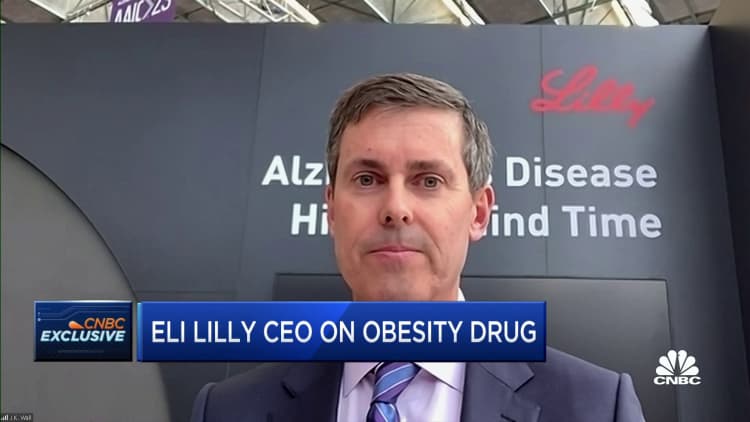
Eli Lilly on Monday said it applied for full U.S. Food and Drug Administration approval of its Alzheimer’s treatment, donanemab, and expects the agency to make a decision by the end of the year.
The application is based on positive phase three clinical trial results on donanemab, which significantly slowed the progression of Alzheimer’s in patients at the early stages of the mind-robbing disease.
The results also showed that treating patients who are at the earliest stages of the disease can slow Alzheimer’s progression by around 40% to 60%.
“The earlier you begin to use the drug perhaps the more slowing that can be,” Eli Lilly CEO David Ricks said in an interview Monday on CNBC’s “Squawk on the Street.”
Eli Lilly is among the pharmaceutical companies racing to market new treatments for the disease after Eisai and Biogen’s drug Leqembi won FDA approval this month. The agency’s signoff on Leqembi was a milestone in the treatment of Alzheimer’s, even though the drug and donanemab aren’t cures.
Both treatments are monoclonal antibodies that target amyloid plaque in the brain, considered a hallmark of the disease.
An FDA approval of Eli Lilly’s donanemab would expand the treatment options for the more than 6 million Americans of all ages who have Alzheimer’s, the fifth-leading cause of death for adults over 65.
The company did not disclose how it would price donanemab after a potential approval.
But the Centers for Medicare & Medicaid Services has said Medicare will cover Alzheimer’s drugs – as long as they receive full FDA approval and health-care providers participate in a registry system that collects data on how the drugs work in the real world.
Ricks said the registry requirement appears to be a “pretty light touch” that doesn’t “take a lot of effort.” But he noted that the data that will be collected seems “pretty low value” in the process.
“So we hope to have that [requirement] rescinded in time and full coverage for donanemab when it’s approved,” Ricks told CNBC.
Positive trial results for Lilly’s Alzheimer’s treatment
Eli Lilly on Monday also presented the final results from the 18-month phase three trial of the monthly antibody infusion donanemab at the Alzheimer’s Association International Conference in Amsterdam. The results confirm the initial data the company released in early May.
The final results also address a previous concern of the FDA, which rejected Eli Lilly’s application for expedited approval of donanemab in January. At the time, the agency asked the company for more data on patients who received the treatment for at least 12 months.
Eli Lilly and Company, Pharmaceutical company headquarters in Alcobendas, Madrid, Spain.
Cristina Arias | Cover | Getty Images
The trial followed more than 1,700 patients in the early stages of Alzheimer’s who had a confirmed presence of amyloid plaque. Roughly half of participants received donanemab.
Patients who received donanemab demonstrated a 35% slower decline in memory, thinking and their ability to perform daily activities at 76 weeks — roughly a year and a half of treatment — compared with those who received a placebo.
Patients at the earliest stage of the disease had a greater benefit after taking donanemab, demonstrating a 60% slower decline in cognitive function.
The trial also found that patients who took donanemab were almost 39% less likely to progress to the next stage of Alzheimer’s disease.
Almost half of patients – 47% – who received donanemab showed no disease progression a year after treatment began, according to the final trial results. That compares with 29% for those who did not receive the drug.
The Alzheimer’s Association, an organization that advocates for people who have the disease, said it “strongly supports” FDA approval of donanemab based on the positive results.
“The results illustrate that initiating treatment as early as possible enables the possibility of a bigger beneficial effect, but also that there is potential for slowing of disease progression even when treatment is started later in the disease progression,” said Maria Carrillo, chief science officer of the Alzheimer’s Association, in a statement.
Benefits and side effects of donanemab
More than half of patients completed the treatment in the first year, and 72% completed it in 18 months due to clearance of amyloid plaque.
The Alzheimer’s Association said that data point is “notable for patients, families, prescribers and payers because patients may not need to receive this treatment on an ongoing basis for the rest of their lives.”
Donanemab cleared amyloid plaque at six months in 34% of patients who had intermediate levels of a protein called tau, which can become toxic and kill neurons.
At 76 weeks, donanemab cleared the plaque in about 80% of patients with the same tau levels. That compares with 0% plaque clearance among those who took the placebo over the same time period.
But donanemab’s benefits will have to be weighed against the risks.
Drugs that target and clear amyloid plaque can cause brain swelling and bleeding in patients that in some cases can be severe and even fatal.
The trial results said nearly 37% of people on donanemab had these side effects, called amyloid-related imaging abnormalities, compared with nearly 15% who received a placebo. Three trial participants died from those side effects, according to Lilly.
Those side effects have also been observed in Leqembi.




